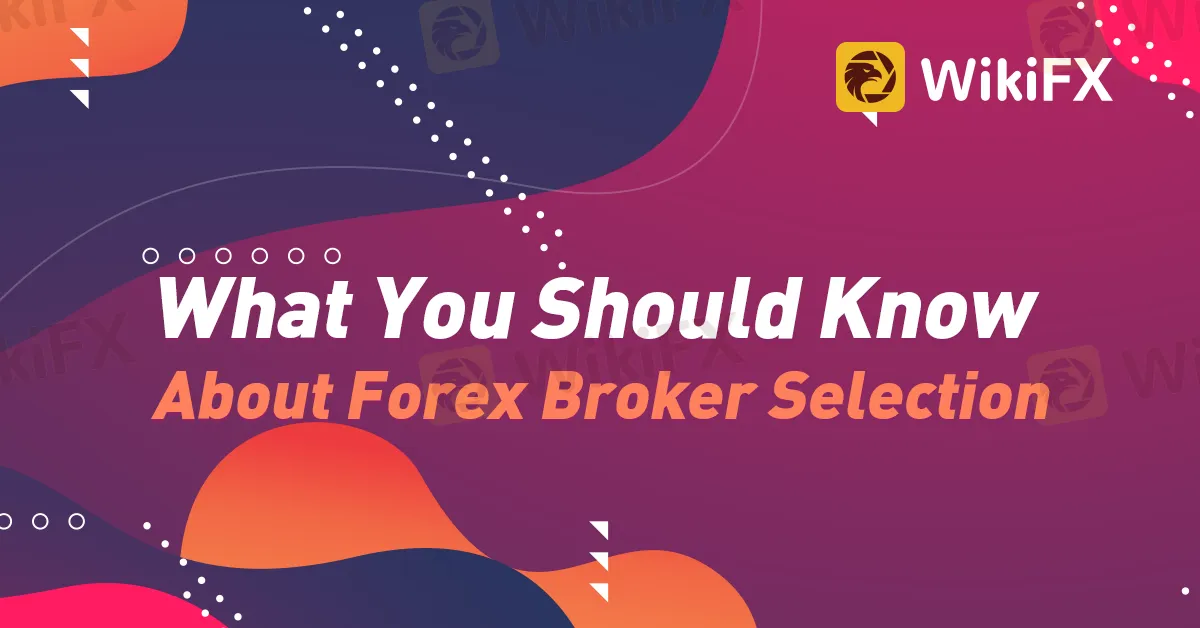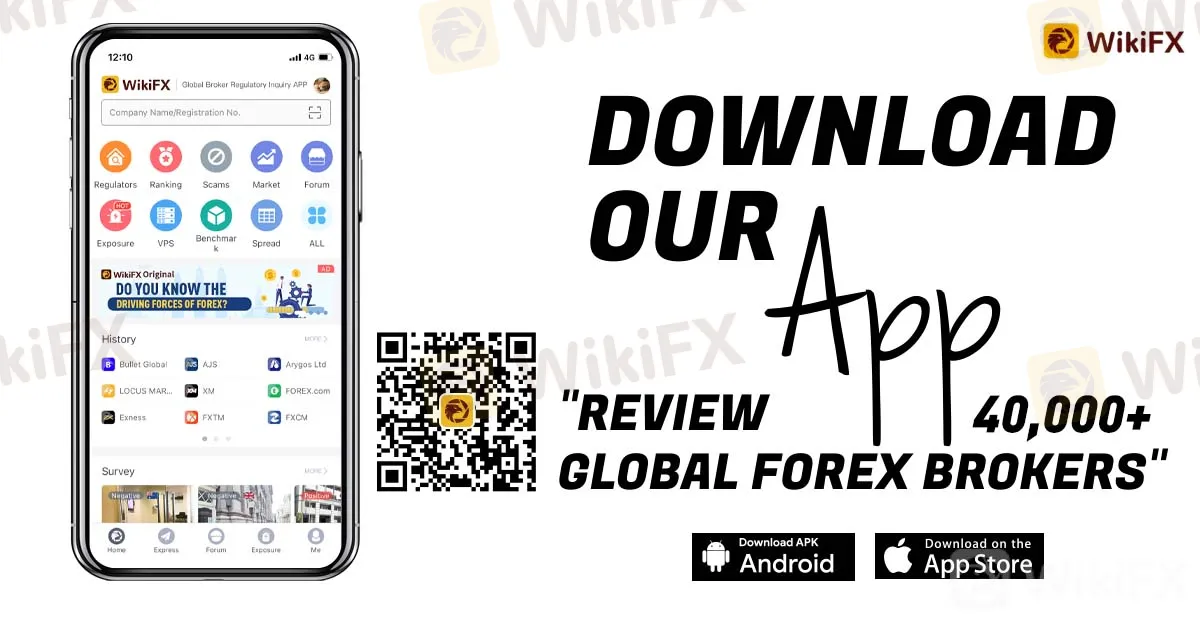简体中文
繁體中文
English
Pусский
日本語
ภาษาไทย
Tiếng Việt
Bahasa Indonesia
Español
हिन्दी
Filippiiniläinen
Français
Deutsch
Português
Türkçe
한국어
العربية
What You Should Know About Forex Broker Selection
Abstract:Through forex (foreign exchange) brokerage accounts, you can make wagers on the global currencies by buying or selling currency pairings that respond to global economic changes. The forex market is open around-the-clock, starting in the United States on Sunday afternoon and closing on Friday afternoon after stock dealers have finished their day's work. As of 2022, currency markets transacted more than $6 trillion daily, surpassing global stock and bond markets in volume.

Through forex (foreign exchange) brokerage accounts, you can make wagers on the global currencies by buying or selling currency pairings that respond to global economic changes. The forex market is open around-the-clock, starting in the United States on Sunday afternoon and closing on Friday afternoon after stock dealers have finished their day's work. As of 2022, currency markets transacted more than $6 trillion daily, surpassing global stock and bond markets in volume.
Downloading WikiFX is the greatest way to find a forex broker. A forex broker search tool called WikiFX lets users rank and review firms. The software also enables users to keep up with the most recent forex news and scams. Both the appstore and playstore offer the WikiFX application.
Forex traders hold long and short positions on currency pairings, which determine the exchange rate between the euro (EUR) and the U.S. dollar as two forms of legal cash (USD). When the exchange rate moves higher, a long position initiates a trade that is profitable; a short sale is profitable when it travels down. To create a short sell position, unlike with stocks, a trader doesn't borrow funds or securities from a broker, but she may have to pay a rollover fee.
Brokers handle fees that may include commissions, access to professional advice, and withdrawal requests. They retain your money in an account that changes value every night in response to daily gains and losses. Potential customers should do their research before opening an account because some brokers bury their charge schedules in legalese that is buried deep in website fine language. Here's a detailed look at how to pick a forex broker to help you avoid unpleasant shocks.
Choosing a Forex Broker
Identifying your investing style and financial objectives is a need before selecting a forex broker.
Every broker that offers forex investments has benefits and drawbacks. Regulation, the level of security offered by these organizations, and transaction fees are some of the most crucial factors to take into account. Every broker has a different set of security measures. To protect accounts from hackers, certain brokers offer built-in security mechanisms including two-step authentication.
There are many regulated forex brokers. The National Futures Association (NFA) and Commodity Futures Trading Commission (CFTC) of the United States, as well as Canada, the United Kingdom, France, Germany, Switzerland, and Austria, all regulate forex brokers. However, not all brokers operate under regulation, so investors should be aware of unregulated companies.
Additionally, platforms, needed account minimums, and transaction costs vary among brokers. You might want to make a budget for your investment life before signing up for a trading platform. Determine your goals, your willingness to pay fees, and how much you would like to invest. When selecting the best platform for you, there are several different aspects to consider. Prior to participating, make careful to consider all relevant factors.
Knowledge of Forex Currency Pairs
It's crucial to understand the fundamentals of forex trading, from currency pairs to pips and earnings, before opening an account.
A currency pair uses a ratio to compare the values of two different currencies. The basic currency, which is always one, is the very first one. The quote currency, which is the second unit of money, shows how much one can be exchanged for. A quote of “EUR/USD 1.23000” indicates that one Euro is equivalent to $1.23.
Each ratio is given in two to five decimal places and is also available in a flipped-over form that results in a new currency pair that moves the other way. To continue with our example, USD/EUR compares the value of the U.S. dollar to the euro, whereas EUR/USD compares the value of the euro to the U.S. dollar. Therefore:

EUR/USD = 1.25000/1.00 = 1.25000
USD/EUR will then equal 1.00/1.25000, or.80000.
Before the popularity of the forex soared earlier this decade, traders from many nations would take long and short positions with their home currency at the bottom (the quotation currency). Today, the currency pair with the biggest volume is traded by the majority of participants worldwide. The most popular version is probably going to have a smaller bid/ask spread, which will reduce trading expenses.
When the ratio rises, forex traders profit from holding long EUR/USD bets; when it falls, they lose money. In contrast, traders profit from shorting the EUR/USD when the ratio declines and lose money when it rises. Despite the fact that brokers may provide dozens of currency pairs, four significant pairs generate the most trading interest:
the euro and the dollar (EUR/USD)
the U.S. dollar and the Japanese yen, or USD/JPY
GBP/USD stands for the British pound sterling and the US dollar.
the U.S. dollar and the Swiss franc (USD/CHF)
Pips and Earnings
Two ratios are shown in forex quotes: a greater asking price and a lower bid price. The lowest price increase, known as a pip, and the last two decimals are frequently printed in very large print (percentage in point). The number of pip gained or lost after the position is closed is used to determine profits and losses. Because traders must purchase at the asking price and sell at the bid price, with the spread being the difference between the two values, all positions begin with a tiny loss.
This is standard practice since the majority of forex brokers don't charge commissions or other costs for transaction execution and instead rely on the bid/ask spread as their primary revenue source. The spreads between major and minor currency pairings are normally less than those between minor currency pairs, but many brokers now provide set spreads, which prevent them from expanding and contracting in response to market conditions, even if it's to your advantage.
For their forex positions, traders must select the lot sizes. The smallest trade size for the currency pair is called a lot. When trading the U.S. dollar, $100,000 is regarded as a typical 100k lot, and it once served as the minimum amount permitted by many forex firms. Mini lots, which come in increments of 10,000 units ($10,000 when trading USD), and micro lots, which come in increments of 1,000 units ($1,000 when trading USD), have modified this.
The amount of pip required to turn a profit or incur a loss decreases with increasing unit size. The following example, in which both trades make the same profit, demonstrates how this operates.
A typical EUR/USD pip equals.00001.
When you purchase $100,000 in EUR/USD at 1.23000 and sell it at 1.23001, you “gain” 1 pip.
(1 pip = (0.00001/1.23000) x 100,000 = $8.10 per pip)
When you purchase $10,000 EUR/USD at 1.23000 and sell it at 1.23010, you “make” 10 pips ($81 cents per pip x 10 pips) = $8.10 profit.
Of course, the knife is double-edged because losing a long or short trade with a large unit size will happen faster than losing a transaction with a small unit size.
As a result, it's critical to thoroughly research your new endeavor before investing real money in it. You should also establish risk-management abilities, such as the proper position sizing, holding times, and stop loss strategies. On the Internet, there are many free pip calculators that might be of great use.
What Is a Margin?
In order to allow customers to buy or sell currency pairs with a total trade amount significantly bigger than the money used to fund the account, new forex accounts are opened as margin accounts. The majority of U.S. brokers allow customers to open accounts for as little as $100 to $500 while providing up to 50:1 margin, which is a considerable amount of leverage and another way of indicating that your trade size will be more than the balance of your current account.
For instance, a forex trader can place long and short bets up to $25,000, or 2.5 times the small lot size, with a $500 account at a 50:1 leverage broker. The ability of leverage to wipe out accounts over night makes it dangerous, but a high margin makes sense because currencies move slowly during calm periods and have minimal default risks, which means the dollar or the euro are unlikely to fall to zero. However, at times of crisis, such as the wild fluctuations in the value of the pound and the euro in 2016 following the British people's vote to leave the European Union, forex volatility can soar to record levels.
Forex brokers, unlike stockbrokers, don't charge interest for utilizing margin, but overnight positions will result in rollover credits or debits depending on the connection between the interest rates in the pair of currencies. Not simply the percentage exceeding the account balance, but the entire trade value determines the credit or debit in this calculation. The trader will get paid nightly while maintaining a long position in the currency with the higher interest rate, and nightly when holding a long position in the currency with the lower interest rate. For short sales, perform the computation in reverse.
Advice for Choosing a Forex Broker
Spend some time finding a trustworthy forex broker to ensure that your funds and trades will be handled properly. The National Futures Association (NFA), a self-regulatory government organization created to promote openness, requires all American forex brokers to register. Check the NFA website to see if the broker is compliant and to see if there are any complaints or disciplinary proceedings that can influence your choice.
When opening a forex account, the security of your money and personal data is more crucial than any other factor because brokers are susceptible to hacking or bankruptcy. U.S. forex brokers don't offer account security, unlike stockbrokers, whose money are safeguarded by the Securities Investor Protection Corporation (SIPC) in the event that the brokerage goes out of business. Even worse, if a forex broker doesn't provide negative balance protection, which guarantees you won't be requested for more money than your account amount if a position fails, it may be able to reclaim more than your account balance through legal action.
After the 2008 financial crisis, regulatory capital requirements significantly increased, yet that didn't stop a wave of bankruptcies in 2015 when the Swiss currency crashed overnight. When the broker shut down, several accounts went into negative balances in a matter of minutes, potentially resulting in further liabilities. Those that survived lost everything. The lesson to be learned from that awful incident is that potential clients should stick with the most reputable brokerage firms, ideally those affiliated with sizable banks or renowned financial institutions.
The “introducing broker” and “white label” categories are used by the American forex market to sell its products and expand its operations. The term “introducing broker” refers to a smaller business that sends clients to a major broker in return for discounts or other rewards. In white labeling, the small business rebrands the trading platform of the major broker, enabling the bigger operation to carry out deals in the background. These businesses may decide to increase fees and/or widen bid/ask spreads as a result of both tactics' potential to raise operational costs.
Review the funding and withdrawal policies of a broker before transferring any funds to them. When funding through checks or wire transfers, some brokers impose lengthy waiting periods before you can start trading, while others impose significant costs when you withdraw money from your account or terminate it. When a broker makes you complete lengthy documents, participate in surveys, or chat with a representative in an effort to change your mind, closing an account in particular can be difficult. From less reputable businesses, getting your money back can take a week or longer.
Through chat, phone, and email, customer service representatives should make it simple to contact the support and trading desks. Look for 24/6 coverage, which means you may get in touch with the broker in the United States any time from Sunday afternoon to Friday afternoon. Open the chat interface and call the phone number to observe how long it takes for a customer service agent to respond before funding the account to gauge the broker's responsiveness.
Platforms for Trading Forex
The interbank market, a communications network used by major financial institutions without a central exchange like NASDAQ or the New York Stock Exchange, is where currency pairs are priced. Although they are not compelled to provide customers with the best interbank bid or ask, forex brokers may purposefully present larger spreads with less favorable prices in order to increase profits when they execute those trades through the system.
On the broker's website, prospective clients can study the deal execution procedures to look for conflicts of interest. Find out specifically if the broker has a dealing desk that makes a market and purchases the other side of a customer trade. Through a wholesale liquidity provider or electronic communications network (ECN) that manages the actual buy and sell transactions, a more dependable broker will post quotes straight from the interbank system. These are independent companies that are linked directly to the labor market.
Through the broker's trading platform, which should combine standalone, web-based, and mobile platforms, forex traders open and close positions. With its broad feature set, which includes real-time quotes, price charts, news, research, and customized watchlists, MetaTrader has recently become the industry standard for standalone software. Cyprus-based MetaQuotes Software Corporation created the MetaTrader platform.

Although it offers an alternative to standalone software, web-based trading frequently has less functionality, necessitating the use of additional resources by account users to complete their trading strategy. With their simplified design and few bells and whistles, mobile apps offer the most ease and typically support one- or two-click trading. The mobile experience should only be used when you are away from your trading station and can't use the full-featured standalone software.
The majority of forex brokers provide demo accounts that allow potential customers to test out the standalone, web interface and mobile platforms while trading currency pairs using fake money. This software is an excellent tool for assessing the accuracy of the broker's bid/ask pricing because it shows the same quotations, charts, and watchlists as the actual system. If a broker doesn't provide a sample account, be wary because it can be operating on a subpar or out-of-date platform.
You may rapidly determine which forex brokers are providing the best bid and ask prices under typical market conditions by comparing several of these accounts with real-time quotations from a significant financial website. If you can, check back soon after a Federal Reserve rate decision or other significant market events to watch how the currency pairs change under extremely turbulent circumstances.
Order Entry Formats
On the demo account, there is a ton of helpful information available on the trade execution screen. Be on the lookout for a range of trade entry types, stop orders, and safety features like Guaranteed Stop Losses and Close All Orders. The trader is protected from severe slippage, or the discrepancy between the expected and actual execution price, by several of these order routing strategies.
Any broker you use should accept the following order types as a minimum:
When placing a market order, the order will be filled right away at the best price. In quick-moving markets, this can result in severe slippage that executes cents or dollars away from the bid or ask price stated at the time of entry.
Stop orders convey a conditional buy or sell order that, at the selected entry price, becomes a market order.
Limit orders transmit a buy/sell order that is only able to be filled at the entry price or higher.
With two prices, stop and limit, stop-limit orders convey a conditional buy or sell order. At the selected stop price, the order becomes a limit order, filling only to the limit price. In the event that the quote exceeds the limit price without being filled, the order will automatically cancel.
As long as the quote crosses through that price, guaranteed stop losses transmit an order that is guaranteed to be filled within the specified constraints.
Close alls send an order to close all open positions at the best available prices. This can incur excessive slippage in fast-moving market conditions.
Does the Forex Broker Offer Trading Education and Tools?
Reputable brokers offer a variety of resources for clients to make smarter decisions and improve their trading skills. Look for an educational section on the website with diverse webinars and tutorials on the fundamentals of forex markets, popular currency pairs, and market forces that generate buying or selling pressure. These materials should include detailed information on how central banks affect currency markets when they raise or lower interest rates and how traders can prepare for those periodic events.
The educational section should also provide instruction on the broker‘s trading platforms, currency pairs, and market order types. Look for videos, manuals, or other tutorials that show you how to build customized watchlists, set up technical charts, and display easy-to-read quote screens. These instructional materials should also explain how to access news and research directly from platforms so you don’t have to surf the Internet looking for information.
Extensive research and economic analysis tools should highlight currency pairs that might offer the best short-term profit opportunities. This section should offer free third-party commentary and insight from industry experts as well as real-time news and live webinars. Look for research that spans the globe rather than just local markets and provides a comprehensive daily economic calendar that lists all market-moving economic releases around the world.
Social trading has gained enormous popularity in recent years and is now available at the most reputable brokers. This feature lets account holders interact with one another through a social hub, sharing trading ideas, strategies and insights. Some social hubs have taken this concept one step further, offering a copy trading interface that lets you mimic the buy and sell decisions of other clients.
The best social hubs will feature some sort of rating system that allows clients to access the most prolific members with ease. These contacts can be enormously useful in customizing trading platforms, which often feature API interfaces that allow third-party add-ons. Its even more helpful when the broker provides a comprehensive add-on library, with contributions that make trade management an easier task.

Disclaimer:
The views in this article only represent the author's personal views, and do not constitute investment advice on this platform. This platform does not guarantee the accuracy, completeness and timeliness of the information in the article, and will not be liable for any loss caused by the use of or reliance on the information in the article.
Read more

Axi Bids AUD 52M to Acquire Low-Cost Broker SelfWealth, Outbidding Competitor Bell Financial
This acquisition attempt by AxiCorp Financial Services Pty Ltd, Axi’s parent company, values SelfWealth at AUD 0.23 per share and is notably higher than a recent bid made by Bell Financial Group Limited (ASX), which offered AUD 0.22 per share.

Warning Against Globalmarketsbull & Cryptclubmarket
Are you thinking about investing in Globalmarketsbull or Cryptoclubmarket? Think again! The Financial Conduct Authority (FCA) issued a warning about these two firms. Here are the details of these unlicensed brokers.

Why Even the Highly Educated Fall Victim to Investment Scams?
Understanding why educated individuals fall victim to scams serves as a stark reminder for all traders to remain vigilant, exercise due diligence, and keep emotions firmly in check.

Broker Review: Is Exnova Legit?
A forex broker named Exnova has recently come to our attention. This broker is registered in Saint Vincent and the Grenadines and started its business in 2021. In this article, we will dig into this broker deeply and provide some information if you are interested.
WikiFX Broker
Latest News
CySEC Warns Against Unauthorized Investment Firms in Cyprus
Why Even the Highly Educated Fall Victim to Investment Scams?
Warning Against Globalmarketsbull & Cryptclubmarket
Dukascopy Bank Expands Trading Account Base Currencies
UK Sets Stage for Stablecoin Regulation and Staking Exemption
Axi Bids AUD 52M to Acquire Low-Cost Broker SelfWealth, Outbidding Competitor Bell Financial
Crypto Influencer's Body Found Months After Kidnapping
STARTRADER Issues Alerts on Fake Sites and Unauthorized Apps
Italy’s CONSOB Blocks Seven Unregistered Financial Websites
Bitfinex Hacker Ilya Lichtenstein Sentenced to 5 Years in Prison
Currency Calculator


